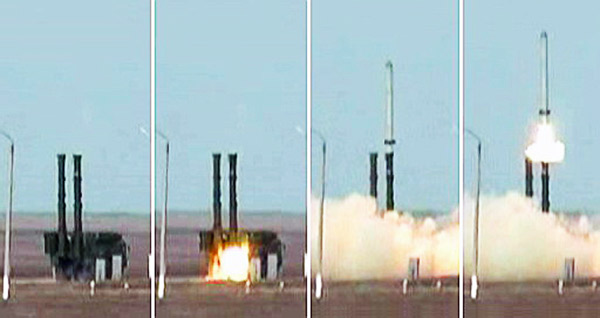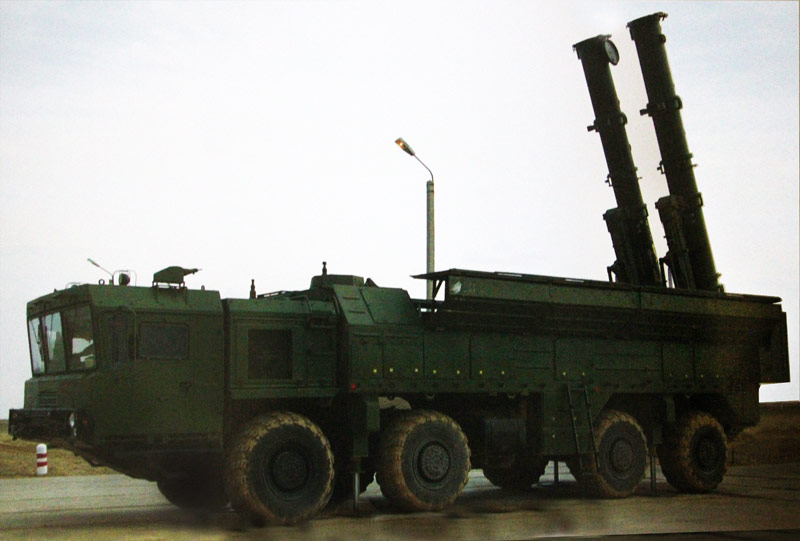
The Obama administration, in a step widely seen as an attempt to put further diplomatic and political pressure on Russia, has accused Moscow of violating a longstanding and relatively noncontroversial arms control treaty, the intermediate-range nuclear forces treaty (INF).
In Russian, the treaty goes by the initials RSMD (raket srednei i menshei dalnosti). The treaty was signed on 8 December 1987 and went into effect on 1 June 1988. After the collapse of the U.S.S.R., several Soviet successor states, including Belarus, Ukraine and Kazakhstan, were temporarily adherents to the treaty, but their participation ceased once they liquidated their nuclear-weapon stocks. The treaty technically prohibits the production, deployment, or use of ground-launched ballistic and cruise missiles with a range of between 500 and 1000 and 5500 kilometers.
When first implemented, the treaty compelled the Soviets to destroy a wide range of weapons systems including the SS-20 “Pioneer,” SSC-X “Slingshot,” SS-12M “Scaleboord,” and the S-23 “Spider.” Ultimately, the Soviets disposed of more than 1,700 missiles and closed 117 installations, substantially more than the 850 missiles and 32 launch stations the United States liquidated. While the treaty itself is not time-limited, the inspection and verification provisions were. Since their expiration in May 2001, both sides have relied on the use of satellites to verify compliance. Despite frequent discussions on the issue, the verification provisions never have been re-implemented.
The Obama administration’s most recent complaint centers on the R-500, which is intended to be used with the “Iskander” system, and has a range of a more than 2,000 kilometers. As Russian sources noted, this was actually not the first complaint registered by the Americans. Virtually identically concerns were raised last year and in January. The Russians also periodically have registered similar complaints about the United States’ use of roughly equivalent systems. Russian complaints about violations of the INF further alleged that the American military’s widespread use of drones—such as the Predator and Reaper—constitute technical violations of the treaty.

In general, one can say that the response from Russian experts has been underwhelming bordering on uninterested. Russian commentators repeatedly have highlighted not only the fact that the missile in question was designed with a range of less than 500 kilometers (thus technically placing it out of the treaty’s jurisdiction), they also note that the Russian government has repeatedly raised similar concerns with the Americans to no discernable effect. As the Russians see it, the weapons in question have been undergoing testing for many years and the only reason the Americans did not more actively raise the issue earlier was to avoid harming relations with Moscow. It’s seen as an insincere attempt to further ratchet up political pressure.
The ministry of foreign affairs, for its part, declared that American concerns were “unfounded” and stated that the appropriate venue for their resolution was the working group established within the treaty framework. If any doubt was left about how the Russian government views the issue, the statement further noted that “the problems with the INF are not new. They are well known to both sides. . . . We have repeatedly raised concerns with the Americans. But they don’t want to listen to us in Washington. In this, as in other serious issues, they only want to listen to themselves.”
Given the long history of mutual recriminations over the INF, the treaty’s relatively imprecise language, and past Russian suggestions that the treaty be annulled entirely, it is exceedingly hard to see how the Obama administration’s effort will have much impact. Relations between Moscow and Washington are now so poisonous and tense, with both sides blaming each other for the shooting down of Malaysian Airlines Flight 17, that a minor treaty violation seems almost like an afterthought. The INF is the kind of vaguely-worded treaty that can only work if both sides trust in and believe one another, and if they are committed to working together to limit the spread of offensive weaponry. No honest observer could say that the current U.S.-Russia relationship is one that is characterized by even a minimal level of trust.
It remains to be seen if or when the Russians will openly walk away from the treaty, but “business as usual” seems an increasingly distant prospect—and it’s likely that the spirit of the treaty (if not its legal basis) will be further and further eroded.





